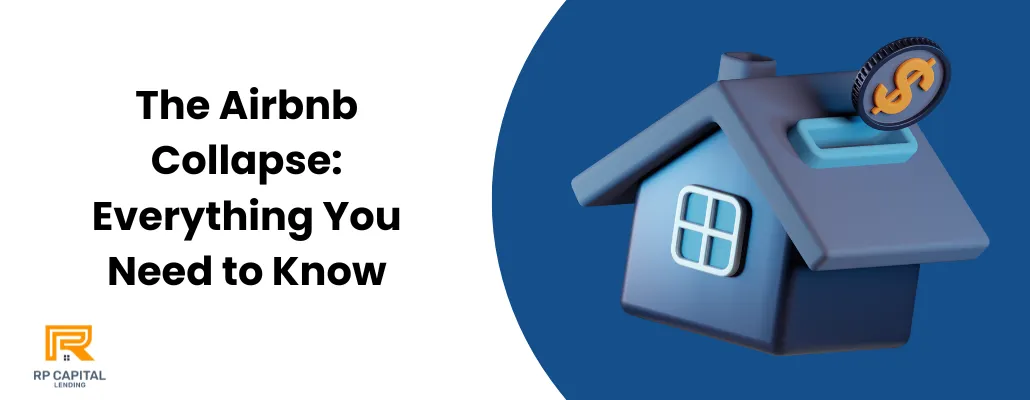Blog

Airbnb Collapse 2025: What It Means for Investors
Over the past decade, Airbnb transformed the way people travel and the way investors think about real estate. What started as a way for homeowners to earn extra income by renting out a spare room quickly evolved into a global short-term rental (STR) marketplace. For many, hosting became a lucrative side hustle or even a full-time business model.
But recently, headlines have warned of an “Airbnb collapse.” Investors, hosts, and even travelers are asking the same question: Is Airbnb in trouble?
The reality is more nuanced. Airbnb isn’t crashing it’s maturing. The STR market is stabilizing after a period of rapid growth, forcing hosts and investors to adapt to new rules, new costs, and higher expectations from guests. If you’re involved in real estate or considering short-term rentals as part of your investment portfolio, understanding these shifts is critical.
At RP Capital Lending, we work with investors every day who are navigating this landscape. Let’s dive into what’s really happening, why it matters, and how you can position yourself for success in 2025 and beyond.
The Short Answer: Is Airbnb Collapsing?
The short answer is no Airbnb isn’t collapsing. The company is still growing, demand for short-term rentals remains strong, and travelers continue to book millions of nights each quarter.
What we’re seeing is more of a market correction:
Oversupply in certain cities caused hosts’ profits to shrink.
Regulations have made it harder to operate casually.
Guests are raising the bar on what they expect.
For investors, this means short-term rentals are no longer a guaranteed goldmine. But with the right market research, financing strategy, and professional management, STRs can still be highly profitable.
What Sparked the Airbnb “Collapse”?
1. Market Saturation
In hotspots like Phoenix, Dallas, and Nashville, investors flooded the market with short-term rentals. Suddenly, travelers had too many choices. That led to:
Lower occupancy rates as listings competed fiercely.
Falling nightly rates as hosts slashed prices to stay booked.
Reduced ROI for investors who hadn’t factored in competition.
📌 Investor tip: Before purchasing a STR property, analyze AirDNA reports, local tourism trends, and historical occupancy rates. This helps avoid oversaturated markets.
2. Regulatory Crackdowns
City governments are stepping in to balance housing supply. For example:
New York City requires STR hosts to register, caps the number of rental days, and enforces steep fines.
San Francisco and Los Angeles require permits and strict compliance with zoning rules.
For investors, these rules can mean unexpected operating costs or even forced exits.
📌 Investor tip: Always check with the local planning or zoning office before closing on a property intended for Airbnb.
3. Economic Pressures & Shifting Guest Behavior
Inflation, higher mortgage rates, and rising utility costs are squeezing hosts’ margins. At the same time:
Guests are cost-conscious. Many prefer smaller stays or are shifting back to hotels for predictability.
Business travel is rebounding, but corporations often book hotels instead of STRs.
This shift has created a new demand for unique, experiential stays treehouses, cabins, or luxury homes that stand out in crowded markets.
4. Rising Competition
Airbnb is no longer the only option. Competitors like Vrbo, Booking.com, and boutique hotels are aggressively targeting the same customers. Many hotels now highlight their reliability, free breakfast, and 24/7 service things STRs sometimes lack.
5. Declining Financial Advantage
In some markets, investors find that long-term rentals provide better cash flow than STRs. They avoid high turnover costs, cleaning fees, and seasonal fluctuations.
📌 Financing perspective: Investors are now running side-by-side cash flow analyses before deciding whether to pursue a property as a short-term or long-term rental.
Airbnb’s Strategic Response
Airbnb has taken action to protect its reputation and improve guest trust:
Delisting poor performers: In 2024, over 100,000 low-quality listings were removed.
Hosting quality system: Hosts with low ratings must improve or risk being removed permanently.
Mandatory listing verification: Rolled out in 2024 and expanding globally, this ensures photos and descriptions match reality.
Premium guest services: Airbnb launched in-home chefs, trainers, and stylists in 260 cities.
For serious hosts, this is good news. The platform is weeding out casual operators and rewarding professional investors who deliver consistent quality.
Is Airbnb Recovering in 2025?
Despite the challenges, Airbnb is showing strong signs of recovery:
Nights booked rose 7% in 2024 compared to the previous year.
Occupancy rates are stabilizing as fewer new listings flood the market.
Airbnb Experiences curated tours, classes, and activities are expanding in over 650 cities, diversifying revenue streams.
This suggests Airbnb isn’t collapsing it’s evolving into a sustainable, professional ecosystem.
The Bigger Picture: STR Market Evolution
The STR industry is moving toward a new normal:
Professionalism is required: Guests expect clean, safe, and well-managed homes no excuses.
Some hosts are exiting: Many who treated hosting as passive income are selling properties or converting them back to long-term rentals.
Housing affordability impact: As properties return to the long-term rental market, housing supply improves in tight markets.
Airbnb as a travel brand: Beyond lodging, Airbnb wants to become a full-service travel platform offering experiences, services, and verified stays.
Should You Still Invest in Short-Term Rentals?
Yes if you approach it strategically.
Here are key factors for success:
Research your market thoroughly: Use tools like AirDNA and Mashvisor to understand demand.
Budget for regulations: Factor in permits, insurance, and compliance costs.
Run it like a hospitality business: Guests compare Airbnbs to hotels, so think about service and consistency.
Financing wisely: STRs often require higher upfront investment for furnishings and setup. Partnering with a private money lender can help you move quickly on opportunities without traditional bank delays.
📌 At RP Capital Lending, we specialize in funding for real estate investors, including short-term rental acquisitions. Our fast approvals and flexible terms help you seize opportunities while the market is evolving.
FAQs
1. Is Airbnb shutting down in 2025?
No. Airbnb is not shutting down it’s focusing on higher-quality listings and diversifying into guest services.
2. Why are some hosts leaving Airbnb?
Lower profits, stricter rules, and rising costs are causing smaller hosts to exit. Professional hosts with quality operations remain competitive.
3. Are short-term rentals still profitable in 2025?
Yes, but success depends on location, uniqueness, and management. Properties in desirable tourist markets or with standout features still achieve strong returns.
4. What risks should investors watch?
Regulatory shifts, market oversupply, and higher operating costs. Always build in buffers when calculating ROI.
5. Should I consider long-term rentals instead?
In some markets, long-term rentals now outperform STRs on stability and cash flow. Running projections on both models helps determine the best fit.
6. How can financing impact STR success?
Fast, flexible financing allows investors to purchase properties before competitors and adapt to changing market needs. This is where private lending plays a crucial role.
Conclusion
The so-called Airbnb collapse isn’t a collapse at allit’s a market correction that separates casual hosts from serious investors. For those willing to treat short-term rentals like a real business, the opportunity remains strong.
At RP Capital Lending, we’re here to support investors navigating this evolving space. Whether you’re purchasing your first Airbnb property or expanding your portfolio, our private money lending solutions help you move quickly, stay competitive, and maximize ROI.
👉 Ready to finance your next real estate investment? Contact RP Capital Lending today to discuss funding options tailored to your strategy.
RP Capital Lending is a d.b.a of RP Capital Partners Inc (NMLS # 2469193) | Privacy Policy
Copyright © 2022. All Rights Reserved.
Disclaimer: Loans only apply to non-owner occupied properties. Rates, terms and conditions offered only to qualified borrowers, may vary upon loan product, deal structure, other applicable considerations, and are subject to change at any time without notice.

